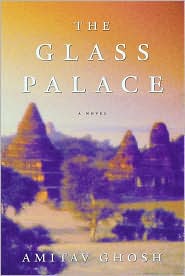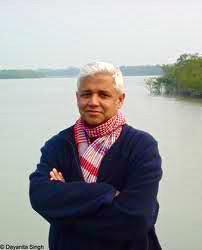Exciting and unusual escape reading.
Full of th e colors, scents, and sounds of exotic Burma and Malaya in the 1860’s, this novel comes to life within the Glass Palace of the royal family and in the streets of Mandalay, which are sometimes the only “home” of its ordinary citizens, in the final days before Britain’s voracious, imperialist juggernaut shoots its way up the Irrawaddy River.
e colors, scents, and sounds of exotic Burma and Malaya in the 1860’s, this novel comes to life within the Glass Palace of the royal family and in the streets of Mandalay, which are sometimes the only “home” of its ordinary citizens, in the final days before Britain’s voracious, imperialist juggernaut shoots its way up the Irrawaddy River.
Giving life to the Burmese point of view, Rajkumar and Dolly, orphaned children working as servants when the novel begins, eventually become the founders of a family whose members, in succeeding generations, reflect the economic and the political realities in Burma, Malaya, and India over the 150 years from the British raj to the present day.
Working as suppliers of teak, petroleum, and rubber, members of this family and of two other families with whom they have close ties, also work as soldiers supporting Britain during World Wars I and II, with the independence movement in Burma and India, and eventually as anti-communist intellectuals in the present state of Myanmar.
By having these families particip ate in the important historical events which occurred in this part of the world, Ghosh does a remarkable job of personalizing these events and making them memorable for readers (especially if they, like me, have little knowledge about these countries). The action, especially during the World War II invasion of Malaya by the Japanese, is vivid and dramatic, as people try to flee the shooting in Malaya but find roads closed to Burma and Siam.
ate in the important historical events which occurred in this part of the world, Ghosh does a remarkable job of personalizing these events and making them memorable for readers (especially if they, like me, have little knowledge about these countries). The action, especially during the World War II invasion of Malaya by the Japanese, is vivid and dramatic, as people try to flee the shooting in Malaya but find roads closed to Burma and Siam.
The extent to which Indian and Burmese troops, fighting for Britain, accelerated the collapse of the British Empire following World War II–and led to the (sometimes temporary) independence of India, Malaysia and Burma, now Myanmar–is presented clearly and unambiguously, and the reader is jolted by the extent to which whole cultures were lost through British zeal to colonize. While this is not War and Peace, The Glass Palace is a fascinating look into the history and cultures of a region which has had little exposure in western novels.
Notes: Also reviewed here: Amitav Ghosh’s SEA OF POPPIES
The Harvard Book Review has an interview with the author and the author’s picture (shown here) on its website: http://www.hcs.harvard.edu
